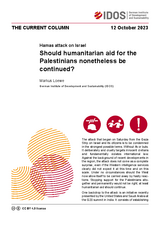Hamas attack on Israel
Should humanitarian aid for the Palestinians nonetheless be continued?
Loewe, MarkusThe Current Column (2023)
Bonn: German Institute of Development and Sustainability (IDOS), The Current Column of 12 October 2023
The attack that began on Saturday from the Gaza Strip on Israel and its citizens is to be condemned in the strongest possible terms. Without ifs or buts. It deliberately and cruelly targets innocent civilians and fundamentally violates international law. Against the background of recent developments in the region, the attack does not come as a complete surprise, even if the Western intelligence services clearly did not expect it at this time and on this scale. Under no circumstances should the West now allow itself to be carried away by hasty reactions. Stopping support for the Palestinians altogether and permanently would not be right; at least humanitarian aid should continue.
One backdrop to the attack is an initiative recently presented by the United States and Saudi Arabia at the G20 summit in India. It consists of establishing a trade corridor of rail lines, ports and airports from India to Europe and North America via Saudi Arabia, the United Arab Emirates (UAE) and Israel. On the one hand, it is intended to form a counterpart to the Chinese project of a “New Silk Road” from China via Russia and Central Asia to Europe and Africa, thus limiting the influence of China and Russia on large parts of the world. On the other hand, the corridor is intended to bind the Gulf states more strongly to the West and reduce the old conflict between them and Israel.
There have been warnings for weeks that Palestinians in the West Bank and Gaza Strip could be the losers in a rapprochement between Israel and the Gulf states. In the event of such a rapprochement, they would only retain backing from Syria and Iran, as many other Arab countries such as Morocco and Jordan have also come to terms with Israel in recent years.
The other loser would be Iran, which for its part had only just embarked on a China-brokered process of reconciliation with Saudi Arabia. Syria, Yemen and the Palestinians would have benefited from the latter process of reconciliation: Syria and Yemen, because Saudi Arabia and Iran support opposing warring parties in these countries, and the respective wars might have lessened in intensity – and the Palestinians, because a united front of Iran and Saudi Arabia would have strengthened their backs against Israel.
The main beneficiary of the attack on Israel is, of course, Hamas, which can once again present itself as the spearhead of resistance against Israel within the Palestinian territories, but above all internationally. Iran also benefits from the attack, as well as possibly China and Russia, because the fight in the Middle East is diverting the world’s attention from the war in Ukraine. All three countries have no interest in a rapprochement between Saudi Arabia and Israel that could strengthen the West’s influence in the Middle East again. Against this background, it is quite conceivable that Iran encouraged Hamas to attack Israel. Moreover, the armed conflicts will lead to the closing of ranks within the countries involved and internal disputes – such as in Israel over judicial reform – will fade into the background.
The losers of the attack, on the other hand, are Israel as a whole and the West – among other reasons, because the rapprochement between Israel and the Gulf states is now uncertain, and the focus is diverted away from the Ukraine war. Equally, however, the Palestinian population in the Gaza Strip will suffer, living under the rule of the terrorist Hamas and suffering much more than Hamas itself from the Israeli counter-attack.
This is precisely why humanitarian support for the residents of the Gaza Strip should not be permanently ended. This support was never intended to strengthen Hamas, but to protect the civilian population from the worst effects of Hamas rule as well as Israel’s blockade of the Gaza Strip. The blockade was also partially in violation of international law. It was and is the historic responsibility of the West to ensure that the population in the Gaza Strip, which only partially supports Hamas, retains access to water, food, health services and education. This is precisely the area in which German development cooperation already worked, and it was mainly implemented by the Red Cross, the European Union and international organisations.
Moreover, it is not at all in the interest of the West to deepen the polarisation between Israel and the Palestinians. In many countries, sympathy for the West would suffer as a result. In any case, in many places the West is accused of hypocrisy: it is said to only defend the rights of the people in Israel and Ukraine, and to ignore the suffering of the people in Palestine, Syria, Yemen and other countries.
For ethical reasons too, hastily stopping all support for the Palestinians cannot be considered. It is correct to say: Hamas was and is a terrorist organisation. In their historical responsibility towards Israel, Germany and Europe must always thoroughly examine which measures of support might play into Hamas’ hands after all. However, Palestinian civilians must not be made to suffer even more. Germany and Europe must also stand by the Israelis and the Palestinians in the long term.


